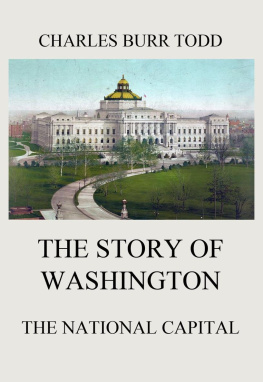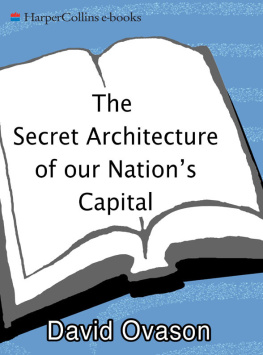The Story ofWashington
The NationalCapital
CHARLES BURRTODD
The Story of Washington, Charles Burr Todd
JazzybeeVerlag Jrgen Beck
86450Altenmnster, Loschberg 9
Deutschland
ISBN:9783849653279
www.jazzybee-verlag.de
admin@jazzybee-verlag.de
CONTENTS:
Whatconstitutes a State?
Nothigh-raised battlement or labored mound,
Thickwall or moated gate;
Notcities proud with spires and turrets crowned;
Not baysand broad-armed ports
Where,laughing at the storm, rich navies ride;
Notstarred and spangled courts
Wherelow-browed baseness wafts perfume to pride.
No! Men,high-minded Men,
Withpowers as far above dull brutes endued
Inforest, brake, or den,
Asbeasts excel cold rocks and brambles rude;
Men whotheir duties know,
But knowtheir rights, and knowing dare maintain,
Preventthe long-aimed blow,
Andcrush the tyrant while they rend the chain:
Theseconstitute a State;
AndSovereign Law, that State's collected will,
O'erthrones and globes elate,
Sitsempress, crowning good, repressing ill.
PREFACE.
Inwriting the Story of Washington, the author has had in mind both the local andgeneral reader; for the national capital belongs not alone to its citizens, butalso to the nation. On the one hand it was desirable not to burden thenarrative with details of merely local interest; on the other, not to treat thesubject in so general a way as to associate with it no local flavor whatever.He has also endeavored to write in a simple and direct style that would attractyouthful readers, and that would not displease those of mature years. It iscommon complaint that our young people read foreign books especially Englishbooks so exclusively, that we are in danger of becoming a race ofAnglomaniacs, a consummation that our law-makers seem bent on furthering bytheir inexcusable delay in passing an international copyright law.
In thesepages the author has endeavored to make prominent what was noble, dignified,and patriotic in the city's history, and thus to awaken in her behalf theinterest and affection of his readers. He has also endeavored to make prominentthe fact that Washington is the capital of the nation, and should be regardedand treated as such. The sectional jealousies which led Congress so long totreat the city with indifference, and to pursue her with a niggardly policythat kept her for years a provincial village, are happily abated. The agitationfor a removal of the seat of government has ceased with them. The laterargument of the " capital-movers, " that the city is not the geographicalcenter, still remains. But this, too, will soon lose its force. Space will beannihilated. As regards communication, distance is not now considered, andwithout doubt in a few years pneumatic tube, air ship, or some other mechanicalcontrivance will in a few hours convey hither the delighted traveler from theGolden Gate or farthest limits of Oregon.
Thecitizen of Washington is dependent on Congress for every crumb of municipalimprovement he gets. He has neither voice nor vote in the government of hiscity. During the past fifteen years Congress has awakened to a sense of itsresponsibilities toward the District and has done much for the capital, whilemuch yet remains to be done.
Americahas material resources far surpassing those possessed by the great empires ofantiquity; she has the requisite artistic and mechanical genius for making themavailable. There is no reason why in everything that men deem noble, beautiful,and excellent, the American capital should not take rank among the greatestcapitals of the earth.
It iswell to remember that a nation's capital may fairly be considered as an indexto the nation's character, and that the outcome of our institutions will bestudied by critical strangers in the city on the banks of the Potomac.
Theauthor acknowledges with pleasure the aid afforded by citizens of Washingtonand others in the prosecution of his work. His thanks are especially due Mr.Justice Bradley of the Supreme Court, Assistant Secretary of State Rives, Mr.Worthington C. Ford, Chief of the Bureau of Statistics, Mr. A. R. Spofford,Librarian of Congress, Mr. William B. Webb, President of the Board ofCommissioners of the District of Columbia, Mr. William B. Powell,Superintendent of Public Schools, and General H. V. Boynton.
It ishardly necessary to name here all the books and periodicals consulted.
Mr.Joseph B. Varnum's " Washington Sketch Book," Messrs. Hutchins andMoore's " National Capital," " The Reminiscences and Letters" of Dr. Manasseh Cutler, Ben: Perley Poore, Dolly Madison, Mrs. W. W.Seaton, and W. A. Gobright, with the files of Harper's, Scribner's and theAtlantic Magazines, the New York Tribune, Times, Herald, and World, theWashington National Intelligencer, Post, and Star, with the unpublishedmanuscripts in the State and War Departments, have formed the basis of thework. A number of the illustrations of public buildings, etc., have been takenby permission from Messrs. Hutchins and Moore's larger work "The NationalCapital."
C. B. T.
Washington,January 2, 1889.
PART I. THE HISTORICAL CITY,
CHAPTER I.THE RESULT OF A COMPROMISE.
Washington,the beautiful capital of to-day, is one of the latest instances of a nationalcapital founded by design. Rome grew on the Tiber because of the seven hills.The great king, Clovis, chose Paris for his capital because its site on anisland of the Seine promised protection from his fierce enemies, the Northmen;and the emperor, Charles V., made the wilderness city Madrid his court townbecause of its inaccessible and defensible position. But the latest example ofa people choosing a wilderness site and erecting there its capital, to beenriched by a nation's revenues, and made historic by its statesmen, orators,and generals, is to be found in our own capital city of Washington. The storyof its birth forms one of the most interesting chapters in its history.
The ideaof a national capital originated in one of the gloomiest periods of thenation's history, and as the result of conditions that threatened to destroy italmost before it had begun to live. On Thursday, the nineteenth day of June,1783, Congress was sitting in the old City Hall at Philadelphia. The Englishyoke had just been broken. The thirteen colonies were free; but their nationalunity was by no means established. They were rather a group of independentsovereignties with warring interests the smaller States arrayed against thelarger, the Northern section against the Southern. The Confederacy's treasurywas empty; it had no credit; worse still, it was heavily in debt to itssoldiers for arrears of pay, and to the States for money loaned to carry on thewar. There was no President, and no capital city to be the rallying point ofnational feeling and aspirations. On the morning of this nineteenth of June, acourier spurred in with news that a body of the unpaid soldiers, then encampedat Lancaster, Pennsylvania, were under arms and on the march to Philadelphia todemand of Congress their arrears of pay, and that they would be followed nextday by all of Armand's legion, with the same object in view. Congress in greatfear appealed to the Executive Council of Pennsylvania for protection, butPresident Dickinson declared that the State militia could not be relied upon ina matter of this kind, and that the soldiers must be allowed to enter the city.Whereupon, we are told, Messrs. Isard, Mercer, and others, " being muchdispleased, signified that if the city would not support Congress, it was hightime to remove to some other place." The next day the mutineers enteredthe city, and for two days, officered by their sergeants, held Congress in astate of siege. They formed a cordon around the hall where it was assembled,and remained under arms all day, sometimes pointing their muskets at thewindows, but refraining from actual violence. After adjournment, as the memberscame out, mock opposition was made to their passage, but they were finallyallowed to retire to their homes. At the evening session a resolution toadjourn to Princeton was introduced and discussed amid the most alarmingrumors. The debate continued for several days, but at last, after the city had beenfive days in the hands of the soldiers, Congress adjourned to Princeton, in NewJersey.






